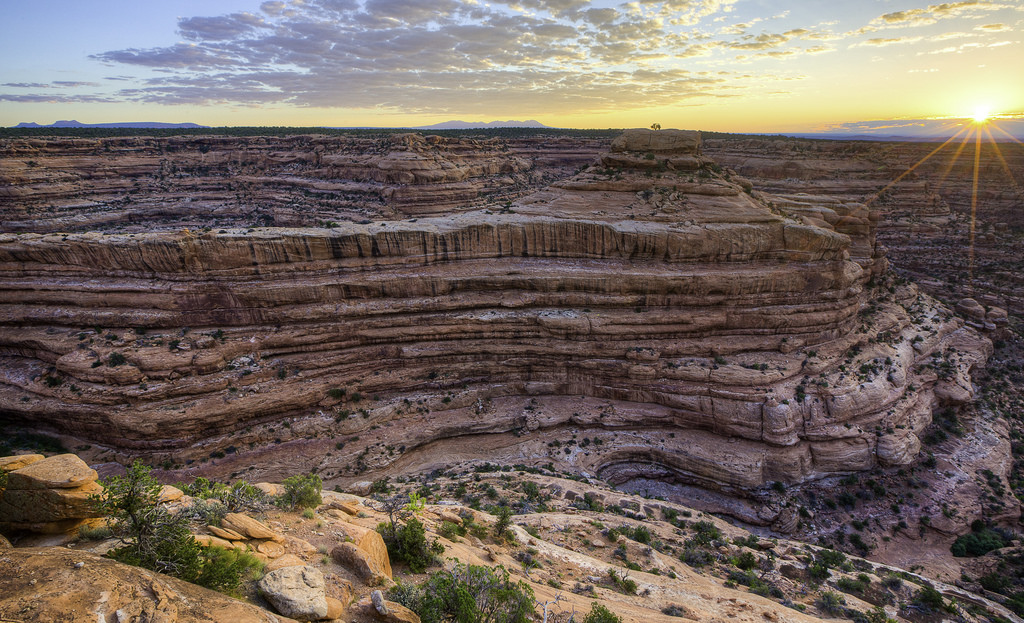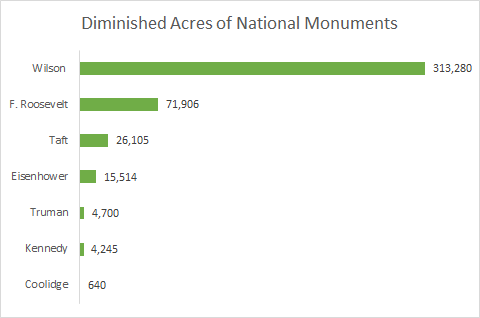
A part of the 1.35 million acre Bear Ears National Monument (Bob Wick, Bureau of Land Mangement/ Creative Commons)

A part of the 1.35 million acre Bear Ears National Monument (Bob Wick, Bureau of Land Mangement/ Creative Commons)
On top of a butte in Wyoming, the United States government used a keyboard to communicate with aliens from a far off world. This iconic scene from “Close Encounter of the Third Kind” was set at the Devils Tower National Monument, the first national monument created by President Theodore Roosevelt.
A policy focus of Theodore Roosevelt was on protecting and embracing the natural beauty of the United States. During his tenure as president, he preserved more than 230 million acres of public land, with the majority of the land becoming public forests. His legacy is seen today with the 150 national forests, 51 federal bird reserves, 4 national game preserves, 5 national parks, and 18 national monuments that he created.
Roosevelt’s most important legacy is the 1906 American Antiquities Act. The main focus of the act gives the president the ability to protect special areas as national monuments and expand monument boundaries. Sixteen presidents have used the Antiquities Act, from Black Canyon of the Gunnison, established by President Hoover, to the Mariana Trench Marine National Monument, established by President Bush.
The part of the Antiquities Act that the Trump administration is focusing on is the “smallest area compatible with proper care and management of the objects to be protected”, which gives the president the ability the reduce the size and scale of the monuments. With help from the Secretary of the Interior Ryan Zinke, President Trump plans to “give the land back to the people.”
President Obama used the Antiquities Act to establish 12 national monuments, over 2.9 million acres of land, in the final two years of his presidency. This has created some controversy, due to how late in his Presidency they were established. One prime example is the Bear Ears National Monument in Utah, established Dec. 28, 2016.
President Obama said in a statement: “For hundreds of generations, native peoples lived in the surrounding deep sandstone canyons, desert mesas, and meadow mountaintops, which constitute one of the densest and most significant cultural landscapes in the United States,” during his Proclamation of Bear Ears National Monument.
The cultures President Obama references are the Native American Tribes that have lived in the area, such as the Navajo Nation, Ute Tribe, and Hopi Nation.
Critics say that President Obama did a last-minute grab at a wide variety of land, which negatively affects the lives of Americans. One of those critics is President Trump. The current president wants to shrink many of the national parks and monuments, and create a greater privatization of these public lands.
According to the National Park Service, presidents have diminished the land of national monuments 16 times, affecting more than 430,000 acres. The president has the power to do so due to the language in the Antiquities Act that states, “National monuments… shall be confined to the smallest area compatible with proper care and management of the objects to be protected.”

It seems as though President Trump is going to use this power to shrink many of the Obama-era national monuments to their “smallest area compatible.” Secretary of the Interior, Ryan Zinke, is reviewing 26 national monuments to see if they are in compliance with the Antiquities Act. This review most likely means that monuments that can be reduced within the boundaries of the Antiquities Act, will be. President Trump has signed executive orders in the past that focus on cutting government waste across the board, so this is no exception.
If the size of the monuments are reduced, the land lost to the monuments would most likely become privatized. Secretary Zinke has stated “some of these areas were put off limits for traditional uses such as farming, ranching, timber harvest, mining, and the land has a chance to be used for these purposes.” Secretary Zinke and President Trump want to reduce the size of the national monuments to save federal dollars and to give control of the land “back to the people.”
Giving “control” back to the people, how President Trump wants, means that the land will be used for mining, farming and ranching. This may help a few, but will ultimately ruin the land for everyone. Creating this “tragedy of the commons” situation will tarnish the legacy that Roosevelt set out to create.
For the Hopi and the Navajo tribes the Bear Ears National Monument is more than a piece of land; it is crucial for their lives and culture. They are connected to that land through their ancestors, their culture, their food, and their medicine. Losing that land under the protection of the Antiquities Act means that a legacy will be thrown to the wolves and potentially ruined for everyone.
President Roosevelt wanted Americans to conserve and preserve the wilderness as well. He said, “There is none which compares in importance with the great central task of leaving this land even a better land for our descendants than it is for us.”
The concept of conservation and preservation of land, resources, and culture is held by millions of Americans who have protested to Secretary Zinke over his possible recommendations. The 45th president needs to hold and embrace these same ideas of the 26th president, since he has power over millions of acres of land.
On December 23, 2016, President Obama angered many Americans with the creation of the Bear Ears National Monument, but was within his full legal authority to create it. Ultimately, President Trump has the same legal right to diminish the size of Bear Ears and any other national monument, but that doesn’t mean that he should.